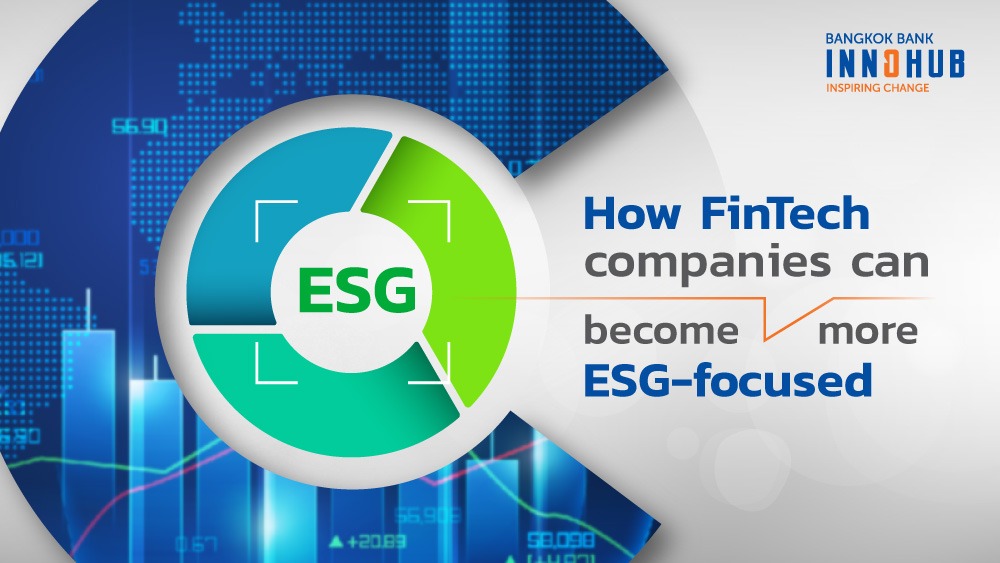The concept of Environmental, Social and Governance (ESG) principles is quickly becoming a key pillar for companies that are eager to become socially conscious and ethically grounded – and to demonstrate this commitment to their stakeholders. In an increasingly global and integrated economy, where reputations are built slowly but can be lost very quickly, companies must show that their operations are based within a framework of ethical management practices that focus on duty of care and responsibility.
Recently ESG has been making strides in the banking and finance sectors, and FinTech – a fast-growing player in the financial sector – has enthusiastically embraced this increased momentum. Companies that are genuine in their ESG commitments are more likely to succeed in maintaining and growing market share, developing brand recognition and respect, as well as building deeper, more robust bonds within the communities they operate. These all increase overall long-term viability, which offsets the limitations inherent in abandoning the old model of unchecked growth at all costs. On a longer timeline, ESG principles can help many companies become even more successful than would be possible under the traditional approach to maximizing profits.
Yet it is not enough to simply “greenwash” operations by making cosmetic changes to business practices. Stakeholders, as well as the general public, are keenly aware when companies are merely paying lip-service to ESG principles – and they react poorly to being deceived. There are numerous websites and even apps that let the general public check if a company is living up to its ESG claims, and companies that make false claims on this front, such as BP and Volkswagen, are among the many that feel the backlash from a public that feels deceived. Getting ESG right is critical to long-term success, and this article will examine how FinTech companies can become more ESG-focused.
Creating greener ways to invest
Beyond the ethical advantages of adopting ESG principles, consumers and employees alike have shown a clear preference for companies that act according to these ideals. Investors have taken note. MasterCard, for example, recently issued a report showing that ESG-related FinTech firms have received 2.5 times more VC equity than their non-ESG counterparts since 2019.
FinTech tools such as AI, advanced data analytics, and the blockchain can efficiently assess whether certain investments are environmentally friendly. Among the ways this task can be carried out is through analyzing their portfolios’ adherence to sustainability goals, as well as their exposure to different risk scenarios involving extreme climate events. When performed skillfully, this research can improve overall profitability amidst growing public awareness and stricter government regulations.
The financial and social implications of this shift are huge. It is estimated that $12 trillion a year could be generated through sustainable business models by 2030. This level of success would create nearly 400 million jobs, most of which would be in developing countries. FinTech is vital for unlocking such growth, as deep data analytics allows for smarter real-time decisions and strategy planning while protecting the environment at a time of unprecedented climate change and increasing global instability.
The automation and standardization of Sustainable Development Goals (SDG) through AI and the blockchain make it easier than ever to accurately assess the environmental and financial implications of various policies, giving a concrete advantage to businesses that develop ESG frameworks.
Building a more inclusive workplace
As issues surrounding equity and diversity take center stage across the global market, companies are swiftly adapting their hiring and marketing policies to better reflect changing demographic trends among their staff and customers.
In the same way FinTech companies focus on building diverse investment portfolios, they should likewise focus on creating a more diverse workforce. Many executive positions within FinTech firms are dominated by males, which tends to set institutional barriers that hinder efforts to become more diverse. Change at the top has been shown to positively affect diverse hiring practices, and is critical for hiring and retaining staff at all levels. Diversity in leadership can therefore help FinTech companies to attract and retain top talent, maximizing positive outcomes.
Especially in the rapidly expanding field of FinTech, addressing the lack of diversity within individual companies and the industry generally is of paramount importance – as a more representative workplace greatly increases companies’ overall ability to scale up quickly and meet existing diversity goals.
Although just 1% of FinTech VC funding goes to female-founded firms, many in the industry expect this number to change rapidly. Companies that address head-on the challenge of representation will be better positioned in future funding rounds, as diverse leadership encourages more creativity, a wider range of perspectives, and innovative solutions to existing obstacles.
Opening up investment to all businesses and individuals
Using big data and other digital analytics tools, FinTech companies can greatly improve their overall financial inclusion policies. Despite the unbanked global population decreasing from 60% in the 2000s to 30% by 2021, a large proportion of the global population is still relatively unbanked or underbanked. By proactively identifying and reaching out to the unbanked to facilitate their participation in these kinds of financial activities, FinTech companies can increase their customer base while building a strong reputation in new communities.
The development of embedded finance and the blockchain are also making investment opportunities increasingly available to individuals and smaller businesses. This development greatly expands the pool of resources which FinTech companies can use to grow and scale their operations. It also gives FinTech stakeholders the opportunity to become more financially active, reaping the benefits of this fast-growing industry.
As the wider society embraces ESG principles, more and more individual investors aim to diversify their investment portfolios to reflect their personal values. These interests include social and environmental responsibility, together with mitigating the risks of an increasingly volatile global economy. As VC funding trends toward ESG-focused businesses, such values consequently provide a high return on investment – making for a promising addition to any investment portfolio.
As with all other organizations and industries, companies that focus on ESG are more likely to thrive in the long run, reaping many reputational benefits from this ethical framework while still generating profits. By encouraging adaptation along these lines, the FinTech industry can lay the foundation for a greener and more inclusive future in the banking and finance sector.




